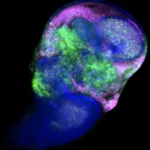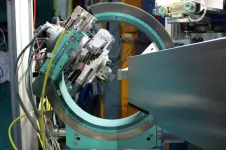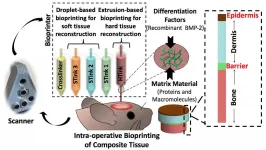Dietary amino acid determines the fate of cancer cells
2021-04-27
(Press-News.org) A research group at the RIKEN Center for Biosystems Dynamics Research (BDR) has discovered molecular events that determine whether cancer cells live or die. With this knowledge, they found that reduced consumption of a specific protein building block prevents the growth of cells that become cancerous. These findings were published in the scientific journal eLife and open up the possibility of dietary therapy for cancer.
A tumor is a group of cancer cells that multiplies--or proliferates--uncontrollably. Tumors originate from single cells that become cancerous when genes that cause cells to proliferate are over-activated. However, because these genes, called oncogenes, often also cause cell death, activation of a single oncogene within a cell is not enough for it to become a cancer cell. This phenomenon is thought to be a "fail-safe" mechanism that prevents cells from easily turning into cancer. For a cell to slip through the cracks and become cancer, several other oncogenes, along with cancer-suppressing genes, need to be activated in a multi-step process. The details of this process were the topic of the new study.
The international research group led by Sa Kan Yoo at RIKEN BDR focused on the oncogene Src and investigated how cell proliferation--oncogenesis--and cell death are regulated in the fruit fly. They showed that Src does not induce cell death as a result of cell proliferation, but instead drives both processes independently and simultaneously. By inhibiting the function of specific genes through RNA interference, the team found that the gene p38 was involved in cell proliferation and the gene JNK was involved in cell death. In addition, they discovered a gene called slpr that simultaneously activates p38 and JNK. "How oncogenes simultaneously promote cell death and cell proliferation has been controversial," says Yoo. "Our major finding was that the oncogene Src promotes cell death and cell proliferation via parallel pathways."
One concept for treating cancer takes advantage of the fail-safe mechanism by inhibiting cell proliferation, but not cell death. To do this, we have to know the molecular players involved in the process. Once the team identified p38 activation as a key step leading to cell proliferation, they realized they could make this concept a reality. After studying what else we know about p38, they realized that its activity can be controlled by nutrients in the diet.
They next set out to test this hypothesis by investigating the relationship between the food fed to fly larvae and cell proliferation. They found that reducing the amount of the amino acid methionine in the diet prevented p38-controlled oncogenesis. "We were excited to find that manipulating the amount of dietary methionine can affect cell proliferation but not cell death," says Yoo. "Currently we don't know whether our finding in flies will translate to cases of human cancer. But, we speculate that it will in particular cases because some human cancers also activate the Src gene.
"We are curious to know how general the mechanism is that we found here. Aside from the Src signaling pathway, we also found that slpr can mediate the signaling pathways controlled by other oncogenes. Finding out how this happens is our next goal."
Since the process of oncogenesis is known to be the same in both fruit flies and mammals, the new findings can help explain how human cancers develop.
INFORMATION:
[Attachments] See images for this press release:

ELSE PRESS RELEASES FROM THIS DATE:
2021-04-27
The COVID pandemic appears to have triggered about a 44% increase in insomnia disorder among health care workers at a medical-school affiliated health system, with the highest rates surprisingly among those who spent less time in direct patient care, investigators say.
Another surprise was that about 10% of the group of 678 faculty physicians, nurses, advanced practice providers, like nurse practitioners and physician assistants, as well as residents and fellows, reported in a 17-question survey that their insomnia actually got better in the early months of the pandemic, says Dr. Vaughn McCall, chair of the Department of Psychiatry and Health Behavior at the Medical ...
2021-04-27
The now-familiar sight of traditional propeller wind turbines could be replaced in the future with wind farms containing more compact and efficient vertical turbines. New research from Oxford Brookes University has found that the vertical turbine design is far more efficient than traditional turbines in large scale wind farms, and when set in pairs the vertical turbines increase each other's performance by up to 15%.
A research team from the School of Engineering, Computing and Mathematics (ECM) at Oxford Brookes led by Professor Iakovos Tzanakis conducted an in-depth study using more than 11,500 hours of computer simulation to ...
2021-04-27
(Media note: Interviews with Texas Biomed researchers are available with advanced notice. Photos and video of rhesus macaques and the Biosafety Level 3 & 4 laboratories at Texas Biomed are available upon request.)
SAN ANTONIO (April 27, 2021) - When the world was coming to grips with an emerging global pandemic a year ago, scientists at Texas Biomedical Research Institute sprang into action. The rhesus macaques at the Southwest National Primate Research Center (SNPRC) at Texas Biomed were quickly validated as models for studying vaccines designed to protect humans ...
2021-04-27
New prostate cancer urine test shows how aggressive disease is and could reduce invasive biopsies
Researchers from the University of East Anglia have developed a new urine test for prostate cancer which also shows how aggressive the disease is.
A new study published today shows how an experimental new test called 'ExoGrail' has the potential to revolutionise how patients with suspected prostate cancer are risk-assessed prior to an invasive biopsy.
The research team say their new test could reduce the number of unnecessary prostate cancer biopsies by 35 per ...
2021-04-27
New estimates confirm that miscarriages occur in 15% of all pregnancies, with one in 10 women experiencing a miscarriage in their lifetime. Recurrent miscarriage is less common, affecting about 1% of women in their lifetime.
Existing care for sporadic or recurrent miscarriage is inconsistent and poorly organised worldwide, and a new system is needed to ensure miscarriages are better recognised and women are given the physical and mental health care they need.
Authors recommend at least a minimum service to all women who have had a miscarriage - with increasing care for recurrent miscarriages - to be offered globally, including testing, treatment, pre-pregnancy counselling, and psychological support.
With variations in the definition, ...
2021-04-27
Nearly 80 percent of higher education faculty report dealing with student mental health issues--issues that more than 90 percent of faculty believe have worsened or significantly worsened during the pandemic, according to a new nationwide survey led by a Boston University mental health researcher.
"The vast majority of faculty members, myself included, are not trained mental health professionals, but we have a role to play in supporting student well-being," says survey principal investigator Sarah Ketchen Lipson, a BU School of Public Health assistant professor of health law, policy, and management. "These data underscore a real opportunity to better equip faculty with knowledge and basic skills to ...
2021-04-26
As researchers continue to study the neurological impacts of COVID-19, a Houston Methodist international collaboration has documented an unexpectedly frequent occurrence of acute transverse myelitis (ATM) - inflammation of the spinal cord - in 43 COVID-19 patients. Led by Houston Methodist neurologist Dr. Gustavo Roman, the study of existing scientific literature found that patients from 21 countries developed spinal cord lesions after contracting the virus. Symptoms included paralysis and sphincter/bowel dysfunction. The patients ages ranged from 21 to 73 and included about half-and-half women and men. ATM, a rare neurological condition, affects between 1.34 and 4.6 cases per million per year, and researchers believe the unusually high rate in post-COVID-19 patients ...
2021-04-26
Each year over 150,000 infants worldwide are infected with HIV in the womb, at birth, or through breastfeeding. Why transmission occurs in some cases but not others has long been a mystery, but now a team led by Weill Cornell Medicine and Duke University scientists has uncovered an important clue, with implications for how to eliminate infant HIV infections.
In a study published April 2 in PLoS Pathogens, the researchers found evidence linking mother-to-child transmission of HIV to rare variants of the virus in the mother's blood that are able to escape broadly neutralizing antibodies (bnAbs)--an emerging ...
2021-04-26
3D printing has opened up a completely new range of possibilities. One example is the production of novel turbine buckets. However, the 3D printing process often induces internal stress in the components which can in the worst case lead to cracks. Now a research team has succeeded in using neutrons from the Technical University of Munich (TUM) research neutron source for non-destructive detection of this internal stress - a key achievement for the improvement of the production processes.
Gas turbine buckets have to withstand extreme conditions: under high pressure and at high temperatures they are exposed to tremendous centrifugal forces . In order to further maximize ...
2021-04-26
Fixing traumatic injuries to the skin and bones of the face and skull is difficult because of the many layers of different types of tissues involved, but now, researchers have repaired such defects in a rat model using bioprinting during surgery, and their work may lead to faster and better methods of healing skin and bones.
"This work is clinically significant," said Ibrahim T. Ozbolat, Hartz Family Career Development Associate Professor of Engineering Science and Mechanics, Biomedical Engineering and Neurosurgery, Penn State. "Dealing with composite defects, fixing hard and soft tissues at once, is difficult. And for the craniofacial area, the results have to be esthetically pleasing."
Currently, fixing a hole in the skull involving both bone and soft tissue requires using bone ...
LAST 30 PRESS RELEASES:
[Press-News.org] Dietary amino acid determines the fate of cancer cells





